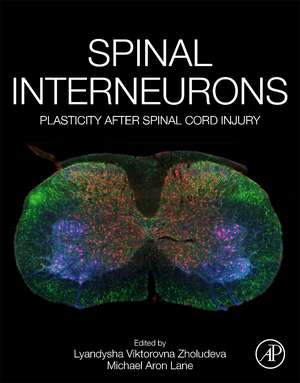Spinal Interneurons: Plasticity after Spinal Cord Injury
Editat de Lyandysha Viktorovna Zholudeva, Michael Aron Laneen Limba Engleză Paperback – 2 dec 2022
Spinal Interneurons provides a focused overview of how scientists classify interneurons in general, the techniques used to identify subsets of interneurons, their roles in specific neural circuits, and the scientific evidence for their neuroplasticity. Understanding the capacity for neuroplasticity and identity of specific spinal interneurons that are optimal for recovery, may help determine cellular candidates for developing therapies.
Spinal Interneurons provides neuroscientists, clinicians, and trainees a reference book exclusively concentrating on spinal interneurons, the techniques and experiments employed to identify and study these cells as part of normal and compromised neural circuits, and highlights the therapeutic potential of these cells by presenting the relevant pre-clinical and clinical work to date. People in industry will also benefit from this book, which compiles the latest in therapeutic strategies for targeting spinal interneurons, what considerations there are for the development and use of treatments, and how such treatments can not only be translated to the clinic, but how existing treatments should be appropriately reverse-translated to the bench.
- Comprehensive overview of techniques used to identify, characterize, and classify spinal interneurons and their role in neural circuits
- Description of the role that spinal interneurons play in mediating plasticity after compromise to spinal neural networks
- In-depth discussion of therapeutic potential of spinal interneurons for spinal cord injury and/or disease
Preț: 690.60 lei
Preț vechi: 902.19 lei
-23% Nou
Puncte Express: 1036
Preț estimativ în valută:
132.19€ • 143.63$ • 111.11£
132.19€ • 143.63$ • 111.11£
Carte tipărită la comandă
Livrare economică 14-28 aprilie
Preluare comenzi: 021 569.72.76
Specificații
ISBN-13: 9780128192603
ISBN-10: 0128192607
Pagini: 474
Dimensiuni: 152 x 229 mm
Editura: ELSEVIER SCIENCE
ISBN-10: 0128192607
Pagini: 474
Dimensiuni: 152 x 229 mm
Editura: ELSEVIER SCIENCE
Public țintă
Neuroscientists, clinicians, and trainees with an interest in the spinal cordCuprins
Section 1: Spinal Interneurons – Motor and Sensory Neuronal Networks
1. The Neuronal Cell Types of the Spinal Cord
2. Identified Interneurons Contributing to Locomotion in Mammals
3. Decoding Touch: Peripheral and Spinal Processing
4. Spinal Interneurons and Pain: functional organization of dorsal horn neurons in acute and persistent pain
5. Cholinergic Spinal Interneurons
6. Spinal Interneurons, Motor Synergies and Modularity
Section 2: Spinal Interneurons – Gatekeepers to plasticity following injury
7. Spinal Interneurons Contribute to Adaptive and Maladaptive Plasticity after Spinal Cord Injury
8. Changes in motor outputs after spinal cord injury
9. Respiratory Spinal Interneurons
10. Spinal Interneuronal Control of the Lower Urinary Tract
11. Spinal interneurons and Autonomic Dysreflexia after Injury
12. Human Spinal Networks: Motor Control, Autonomic Regulation and Somatic-Visceral Neuromodulation
13. Spinal Interneurons post-Injury: Emergence of a different perspective on spinal cord injury
14. The Unified Theory of Central Pattern Generator Function After Spinal Cord Injury
15. Spinal Interneurons & Cell transplantation
16. Spinal Interneurons and Cellular Engineering
1. The Neuronal Cell Types of the Spinal Cord
2. Identified Interneurons Contributing to Locomotion in Mammals
3. Decoding Touch: Peripheral and Spinal Processing
4. Spinal Interneurons and Pain: functional organization of dorsal horn neurons in acute and persistent pain
5. Cholinergic Spinal Interneurons
6. Spinal Interneurons, Motor Synergies and Modularity
Section 2: Spinal Interneurons – Gatekeepers to plasticity following injury
7. Spinal Interneurons Contribute to Adaptive and Maladaptive Plasticity after Spinal Cord Injury
8. Changes in motor outputs after spinal cord injury
9. Respiratory Spinal Interneurons
10. Spinal Interneuronal Control of the Lower Urinary Tract
11. Spinal interneurons and Autonomic Dysreflexia after Injury
12. Human Spinal Networks: Motor Control, Autonomic Regulation and Somatic-Visceral Neuromodulation
13. Spinal Interneurons post-Injury: Emergence of a different perspective on spinal cord injury
14. The Unified Theory of Central Pattern Generator Function After Spinal Cord Injury
15. Spinal Interneurons & Cell transplantation
16. Spinal Interneurons and Cellular Engineering
Recenzii
*4 stars* "...a deep dive into different populations of interneurons, with an emphasis on how they change after injury [including] background on various neuron populations, how they are defined, and general spinal cord physiology.... [D]oes an excellent job compiling the most recent scientific studies to ensure the research is up to date, as well as picking old, seminal experiments to give greater context.... [A] compelling case that spinal cord interneuron populations will be key targets for future spinal cord injury treatment and management.... [T]he authors do a great job of organizing the complex topic of spinal cord interneuron circuitry by splitting chapters based on a function, and then subdividing these topics based on known interneuron populations.... Throughout the entire book, illustrations help clarify key concepts explained in the text.... No other book dedicated to spinal interneurons has been published,... [so] this book is the first piece of literature to take an all-encompassing view on spinal interneurons..." -- ©Doody’s Review Service, 2024, David A Jaffe, BS, MD/PhD Candidate (Thomas Jefferson University)
